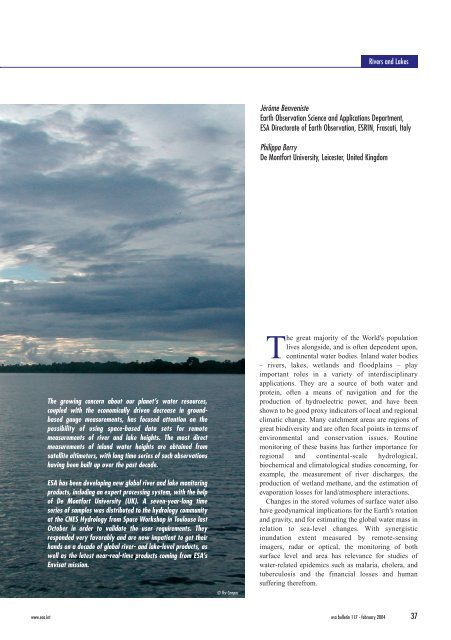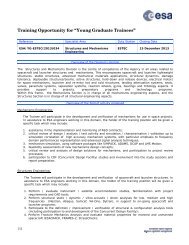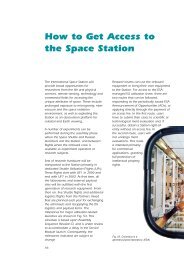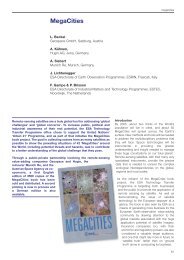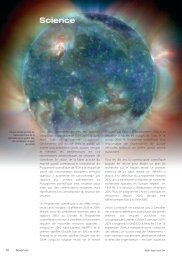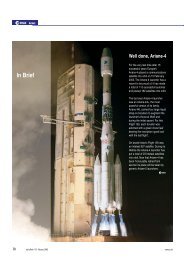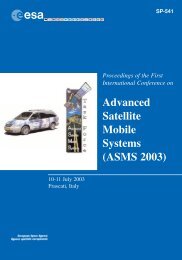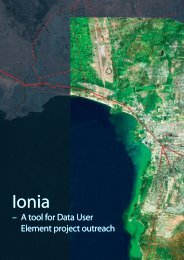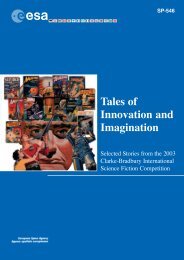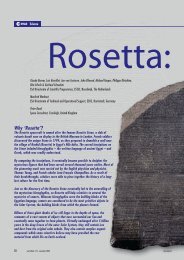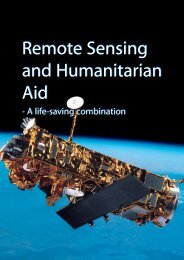Monitoring River and Lake Levels from Space - ESA
Monitoring River and Lake Levels from Space - ESA
Monitoring River and Lake Levels from Space - ESA
You also want an ePaper? Increase the reach of your titles
YUMPU automatically turns print PDFs into web optimized ePapers that Google loves.
The growing concern about our planet’s water resources,<br />
coupled with the economically driven decrease in groundbased<br />
gauge measurements, has focused attention on the<br />
possibility of using space-based data sets for remote<br />
measurements of river <strong>and</strong> lake heights. The most direct<br />
measurements of inl<strong>and</strong> water heights are obtained <strong>from</strong><br />
satellite altimeters, with long time series of such observations<br />
having been built up over the past decade.<br />
<strong>ESA</strong> has been developing new global river <strong>and</strong> lake monitoring<br />
products, including an expert processing system, with the help<br />
of De Montfort University (UK). A seven-year-long time<br />
series of samples was distributed to the hydrology community<br />
at the CNES Hydrology <strong>from</strong> <strong>Space</strong> Workshop in Toulouse last<br />
October in order to validate the user requirements. They<br />
responded very favorably <strong>and</strong> are now impatient to get their<br />
h<strong>and</strong>s on a decade of global river- <strong>and</strong> lake-level products, as<br />
well as the latest near-real-time products coming <strong>from</strong> <strong>ESA</strong>’s<br />
Envisat mission.<br />
© Ilce Campos<br />
<strong>River</strong>s <strong>and</strong> <strong>Lake</strong>s<br />
Jérôme Benveniste<br />
Earth Observation Science <strong>and</strong> Applications Department,<br />
<strong>ESA</strong> Directorate of Earth Observation, ESRIN, Frascati, Italy<br />
Philippa Berry<br />
De Montfort University, Leicester, United Kingdom<br />
The great majority of the World's population<br />
lives alongside, <strong>and</strong> is often dependent upon,<br />
continental water bodies. Inl<strong>and</strong> water bodies<br />
– rivers, lakes, wetl<strong>and</strong>s <strong>and</strong> floodplains – play<br />
important roles in a variety of interdisciplinary<br />
applications. They are a source of both water <strong>and</strong><br />
protein, often a means of navigation <strong>and</strong> for the<br />
production of hydroelectric power, <strong>and</strong> have been<br />
shown to be good proxy indicators of local <strong>and</strong> regional<br />
climatic change. Many catchment areas are regions of<br />
great biodiversity <strong>and</strong> are often focal points in terms of<br />
environmental <strong>and</strong> conservation issues. Routine<br />
monitoring of these basins has further importance for<br />
regional <strong>and</strong> continental-scale hydrological,<br />
biochemical <strong>and</strong> climatological studies concerning, for<br />
example, the measurement of river discharges, the<br />
production of wetl<strong>and</strong> methane, <strong>and</strong> the estimation of<br />
evaporation losses for l<strong>and</strong>/atmosphere interactions.<br />
Changes in the stored volumes of surface water also<br />
have geodynamical implications for the Earth’s rotation<br />
<strong>and</strong> gravity, <strong>and</strong> for estimating the global water mass in<br />
relation to sea-level changes. With synergistic<br />
inundation extent measured by remote-sensing<br />
imagers, radar or optical, the monitoring of both<br />
surface level <strong>and</strong> area has relevance for studies of<br />
water-related epidemics such as malaria, cholera, <strong>and</strong><br />
tuberculosis <strong>and</strong> the financial losses <strong>and</strong> human<br />
suffering there<strong>from</strong>.<br />
www.esa.int esa bulletin 117 - february 2004 37


